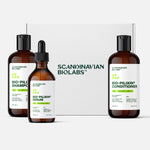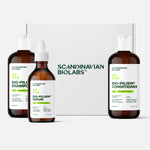In the ever-evolving world of hair care, individuals are constantly searching for innovative and natural solutions to promote healthier, stronger, and more vibrant hair. One such potential remedy that has gained attention in recent years is the use of aspirin for hair growth. But how exactly does one use aspirin for hair growth, and is it an effective and safe option? In this comprehensive article, we'll dive into the science behind aspirin's potential benefits for hair growth and provide step-by-step guidance on how to incorporate it into your hair care routine.
How to Use Aspirin for Hair Growth
Aspirin, or acetylsalicylic acid, is a common over-the-counter medication primarily used as a pain reliever and anti-inflammatory. However, some individuals have turned to using aspirin as a home remedy for promoting hair growth, with varying degrees of success. Here's how to use aspirin for hair growth:
Aspirin Paste
One of the most common methods of using aspirin for hair growth is by creating an aspirin paste. To do this:
- Crush 2-3 uncoated aspirin tablets into a fine powder.
- Mix the aspirin powder with a small amount of water to create a thick, spreadable paste.
- Apply the aspirin paste directly to your scalp, focusing on areas with thinning or hair loss.
- Leave the paste on your scalp for 15-20 minutes before rinsing it off with cool water.
- Repeat this process 1-2 times per week, or as directed by a healthcare professional.
Aspirin Shampoo
Another way to incorporate aspirin into your hair care routine is by adding it to your shampoo. To do this:
- Crush 2-3 uncoated aspirin tablets into a fine powder.
- Mix the aspirin powder directly into your regular shampoo, stirring well to combine.
- Use the aspirin-infused shampoo as you would your regular shampoo, massaging it into your scalp and hair.
- Rinse the shampoo out thoroughly with cool water.
- Repeat this process 1-2 times per week, or as desired.
Aspirin Hair Mask
For a more intensive treatment, you can create an aspirin-based hair mask:
- Crush 4-5 uncoated aspirin tablets into a fine powder.
- Mix the aspirin powder with a nourishing hair mask or deep conditioner of your choice.
- Apply the aspirin-infused mask to your scalp and hair, focusing on areas of thinning or hair loss.
- Leave the mask on for 20-30 minutes before rinsing it out thoroughly with cool water.
- Use this aspirin hair mask 1-2 times per week, or as recommended by a healthcare professional.
The Science Behind Aspirin for Hair Growth
The potential benefits of using aspirin for hair growth stem from its anti-inflammatory and blood circulation-boosting properties. Here's a closer look at the science behind aspirin's potential effects on hair health and growth:
Anti-Inflammatory Properties
Aspirin is a nonsteroidal anti-inflammatory drug (NSAID) that can help reduce inflammation in the scalp. Inflammation can be a contributing factor to various forms of hair loss, such as androgenetic alopecia and telogen effluvium. By reducing inflammation, aspirin may help create a more favorable environment for healthy hair growth.
Improved Blood Circulation
Aspirin is believed to have the ability to improve blood circulation in the scalp, which can help deliver essential nutrients and oxygen to the hair follicles. Increased blood flow to the scalp may stimulate hair growth and support the overall health of the hair and scalp.
Potential Inhibition of DHT
Some studies suggest that aspirin may have the potential to inhibit the production of dihydrotestosterone (DHT), a hormone that is known to contribute to male and female pattern baldness. By reducing DHT levels, aspirin may help slow or prevent hair loss in those with androgenetic alopecia.
Potential Risks and Considerations
While using aspirin for hair growth may seem like a simple and natural solution, it's important to consider the potential risks and side effects:
Skin Irritation
Aspirin can be a skin irritant, especially when applied directly to the scalp. This can lead to redness, itching, or even burning sensations. Individuals with sensitive skin or pre-existing scalp conditions may be more prone to these side effects.
Allergic Reactions
Some people may be allergic to aspirin or its active ingredients. Using aspirin-based hair treatments can potentially trigger an allergic reaction, such as hives, swelling, or difficulty breathing. It's crucial to perform a patch test before applying aspirin to the scalp.
Systemic Absorption
When applied topically, aspirin can be absorbed through the skin and enter the bloodstream. This can lead to potential systemic side effects, especially for those taking other medications or with underlying medical conditions. Consulting a healthcare professional is recommended before using aspirin for hair growth.
Alternatives and Complementary Treatments
If you're hesitant about using aspirin for hair growth or have concerns about its potential risks, there are other alternative and complementary treatments worth considering:
- Minoxidil (Rogaine): A clinically proven topical treatment for stimulating hair growth and preventing further hair loss.
- Biotin and other hair-growth vitamins: Supplements containing biotin, zinc, and other essential nutrients can support healthy hair growth.
- Laser therapy: Low-level laser therapy (LLLT) devices have been shown to promote hair growth and thickness.
- Scalp massage: Regularly massaging the scalp can help improve blood circulation and support hair follicle health.
Conclusion
Using aspirin for hair growth is a home remedy that has gained some attention, but its effectiveness and safety are not yet conclusively proven. While aspirin's anti-inflammatory and blood circulation-boosting properties may offer potential benefits, the risks of skin irritation, allergic reactions, and systemic absorption should be carefully considered.
Before incorporating aspirin into your hair care routine, it's essential to consult with a healthcare professional, especially if you have any underlying medical conditions or are taking other medications. Exploring alternative and complementary treatments, such as minoxidil, hair growth supplements, and laser therapy, may be safer and more effective options for promoting healthy hair growth.
Ultimately, maintaining a well-rounded approach to hair health, which includes a balanced diet, stress management, and gentle hair care practices, is the best way to support your hair's growth and vitality. By understanding the potential uses and limitations of aspirin for hair growth, you can make an informed decision that aligns with your individual needs and hair care goals.
Unlock the Power of Scandinavian Biolabs for a Healthier, Fuller Head of Hair
At Scandinavian Biolabs, we believe that everyone deserves to feel confident and beautiful in their own hair. That's why we've dedicated ourselves to developing cutting-edge formulations against hair thinning that are safe, effective, and backed by science.
Our revolutionary products are designed to combat your hair loss concerns. With Scandinavian Biolabs, you can finally say goodbye to hair loss and embrace a healthier, fuller head of hair.
Don't let hair loss hold you back any longer. Experience the Scandinavian Biolabs difference and unlock the potential of your hair's natural beauty.
Read more:


